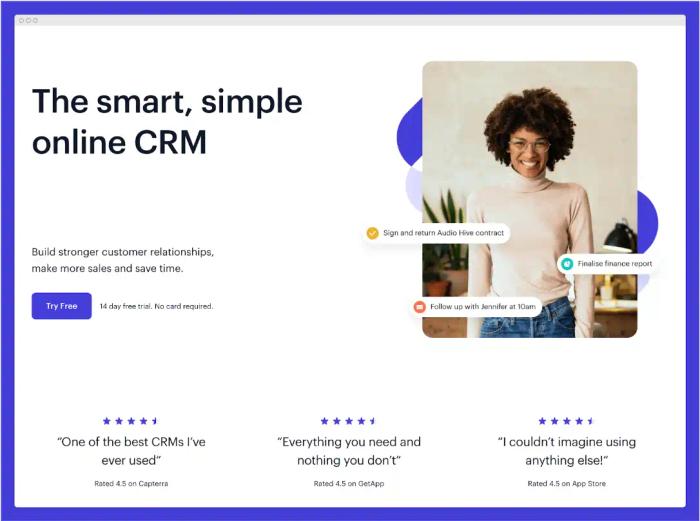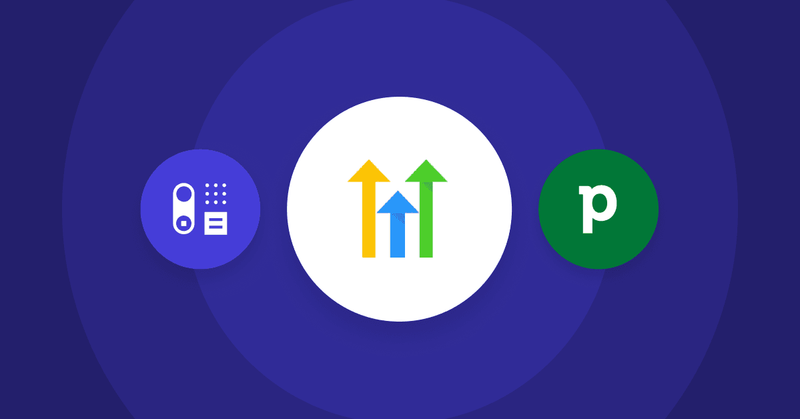Usually, CRM solutions are not one-size-fits-all – and that’s okay. If High Level CRM isn't aligning with your business needs, it's time to consider other options.
We've identified the best four alternatives to improve your customer relationships. Take a look at our comparison so that you can make an informed decision about the switch.
What is High Level CRM?
HighLevel is an all-in-one platform designed to boost your marketing and sales. It combines tools, support, and resources to help you achieve your marketing goals.
It’s a good solution for anyone looking to get their business going. HighLevel helps generate leads and manage conversations, and offers everything from landing pages to automated messaging. Using High Level CRM, you can manage various marketing operations in one place. Whether you want to grow your business, keep clients longer, or onboard more customers – HighLevel has a solution for you.
Our focus today will be on its ability as a CRM.
Key features of High Level CRM
- Comprehensive platform: HighLevel combines marketing and sales tools in one platform.
- Lead capture: It offers various tools like landing pages, surveys, forms, as well as calendars to capture leads.
- Automated messaging: HighLevel automates messages through voicemail, forced calls, SMS, emails, and FB Messenger.
- Payment collection: Integrations with Stripe allow you to collect payments on websites, funnels, or booking forms.
- Pipeline management: High Level CRM keeps track of leads in the sales funnel, so you can manage your workflow efficiently.
- Membership platform: The tool allows for the creation of membership areas with course management, with both free and paid courses.
- White label solution: HighLevel offers a white-label platform so you can personalize the CRM and mobile app.
- Community and support: It provides a community of digital marketers for networking and sharing strategies, along with 24/7 support.
- Marketing automation: You can create multi-channel follow-up campaigns for engaging leads and automating booking.
Why should you look for High Level CRM alternatives
While HighLevel CRM is well-regarded for its comprehensive tools in:
- Marketing automation,
- Sales automation,
- and Customer Relationship Management,
It also presents certain limitations.
This might lead small to medium-sized businesses to seek alternatives to HighLevel CRM, for reasons such as:
Limited features on basic plans
The basic plans of HighLevel CRM offer a limited set of features. To access advanced email automation and detailed reports, you need to upgrade your plan. Small businesses might want to leverage these features but cannot afford to do so if they have a limited budget.
Pricing
Some businesses may find HighLevel CRM too expensive – monthly packages start at $97, so especially small businesses might not be able to afford it.
An intricate feature structure
HighLevel CRM has a lot of features in general, and this might be overwhelming for some users. People who need simpler tools might find HighLevel hard to use and have to spend extra resources on training.
Reporting tools
HighLevel CRM's basic plans may not meet all your needs when it comes to reporting and analytics. Other CRMs might have more detailed reporting tools that work better for some businesses.
Best 7 alternatives to High Level CRM
Let's have a look at some of the solutions that outperform HighLevel CRM in those aspects where it doesn’t necessarily shine:
#1 - Capsule CRM
Capsule CRM is an easy-to-use, intuitive platform created to assist companies in maintaining and growing customer relationships.

Key features
- Sales pipeline: Monitor your deals through various stages with a visual sales pipeline.
- Customization: Tailor Capsule to meet your business needs with customizable fields, tags, and dashboards for essential data storage.
- Contact management: Enjoy Capsule’s approach to storing and handling contacts, and get easy access to customer details.
- Reporting and analytics: Gain a detailed understanding of your business's performance through comprehensive reports and analytics.
- Email integration: Integrate Capsule flawlessly with email services like Transpond, Gmail, and Outlook, and simplify the tracking and organization of email interactions with contacts.
- Task management: Effectively manage and allocate your tasks in your team.
- Mobile CRM: Handle CRM tasks from anywhere, thanks to Capsule’s mobile app with full functionality on different mobile devices.
- Custom lists and filters: Take advantage of the filtering and list-making tools that help businesses effectively segment and manage their contacts and sales information.
- Integration with other apps: Integrate it with popular applications such as G Suite, Mailchimp, Xero and QuickBooks.
Pros of Capsule CRM
- Ease of use: Capsule CRM is known for its straightforward and user-friendly, full suite platform, which is suitable for users with various tech skills.
- Excellent integration: Extremely smooth integration with other applications like Xero adds great value to businesses of all sizes.
- Reliable customer support: The customer support team is often highlighted for being responsive and supportive.
- Efficient sales pipeline management: Capsule’s sales pipeline visualization is valued for managing deals and predicting sales outcomes.
- Customizable and flexible: The software offers extensive customization options to fit different business requirements and processes.
User reviews
- Spencer C.: "Easy to use and most importantly easy to keep using, so that vital customer and supplier interactions are recorded. The Customer support is great too. A product specialist responded directly to a suggestion I made to improve the dashboard to let me know that it is now available. Ease of integration is also a key benefit, whether that be with Zapier or native integrations. New functionality and integration are being added all the time too. Worth a trial if you're a small/medium-sized business looking to use a significant proportion of the functionality of a CRM app.”
- Sue Keogh: “The thing I like about Capsule is that when I was first getting to know how to use it any time I thought, I wonder if it does this, it always did.”
- Anne-Marie M.: “We have used Capsule for just over 6 years first as a free account and then moved onto paid after about 2 years. We tend to use it in the way opposite way to most organisations. We use Opportunities as a way of tracking our ongoing work that has been commissioned and Projects as a way of tracking quotes. We use 'Tracks' a lot and also the tags. We particularly like the email integration with GMail and also the Freeagent integration. I know we plan to use Transpond this year as we have just recruited a Social Media manager/ Administrator.”
Best for:
- Small to medium-sized businesses: Best for those looking for a CRM that's easy to start with and has all the necessary features.
- Companies focused on email marketing: A top choice for businesses heavily involved in email marketing and communication as it has a dedicated marketing add-on.
- Sales teams: Ideal for sales groups that need effective pipeline management, sales analytics, and lead tracking.
- Businesses needing customization: Suitable for companies that want a CRM tailored to their specific requirements.
- Companies seeking strong integration: Excellent for businesses needing a CRM that integrates well with other tools.
Pricing
Capsule offers a free CRM plan for up to 2 users. It’s a cost-effective choice for small and medium businesses. The Professional plan is affordably priced, particularly with yearly plans in mind. A complete CRM solution at a great price. View Capsule's pricing options here.
#2 - Hubspot CRM
HubSpot CRM is a cloud-based customer relationship management platform. It assists businesses in managing and analyzing customer interactions and data throughout the customer lifecycle. In addition to streamlining processes, Hubspot CRM helps increase sales.
Key features
- Contact management
- Email tracking
- Deal tracking
- Marketing automation
- Reporting dashboards
Considerations and challenges
- Pricing concerns: HubSpot can quickly get really expensive for many businesses. While it has a free plan, it does not include advanced features. The Professional plan offers more tools, but it costs $1,600/month. For small businesses or startups, this is a lot.
- Complexity and overwhelming features: Paid plans in HubSpot include many features most businesses don't need, which can be overwhelming when it comes to onboarding.
- Limited features on lower plans: On the other hand, both Free and Starter plans offer very few features. This might be a problem for businesses that need more without paying a lot.
Pricing
Within a free plan, HubSpot gives you basic CRM features that are suitable for small businesses, but might not fulfill all their needs. However, as businesses grow, they might have to move to higher-tier plans. A Professional plan can cost as much as $1,600 per month and can quickly become even more expensive with various add-ons.
#3 - Pipedrive CRM
Pipedrive CRM is a web-based customer relationship management tool tailored for sales teams. Its aim is to simplify the sales process and increase sales efficiency. Pipedrive provides a visual sales pipeline that offers clear visibility of sales operations from beginning to end.
Key features
- Sales pipeline management
- Activity reminders
- Customizable reports
- Email integration
- Mobile app access
Considerations and challenges
- Pricing: Pipedrive offers several pricing tiers, which makes it accessible for businesses of all sizes. The more advanced features, however, are locked behind higher-priced plans, which can become costly quite quickly.
- Feature limitations at lower tiers: The entry-level plans of Pipedrive provide basic functionalities that might not meet the needs of more advanced sales teams. Essential features like advanced reporting and full email integration are reserved only for higher-tier plans.
- Learning curve: Pipedrive is intuitive, but new users might experience a steep learning curve as they learn its functionality.
- Integration costs: Pipedrive integrates with many third-party applications. Integrations may require additional costs, which could raise the overall price of your tech stack.
Pricing
Pipedrive's pricing strategy begins with an affordable Essential plan (14 EUR per seat per month), which should be the right choice for small teams. As businesses expand and require deeper insights, they can upgrade to more advanced plans such as Advanced, Professional, or Enterprise. These plans introduce more comprehensive features but also come with higher monthly costs.
#4 - Keap CRM
Keap CRM is a comprehensive customer relationship management platform. It promises to help businesses manage client accounts efficiently and improve customer interactions in order to boost growth.
Key features
- Inbound phone system
- Track analytics
- SMS marketing
- Google Ads integration
- Automated lead messaging
Considerations and challenges
- Complexity and learning curve: With its extensive range of features, including a page builder and integrations with multiple platforms, new users might find Keap's offering overwhelming. As such, they may require additional time and resources to fully leverage the platform.
- Limited features on lower plans: Keap's basic plans may not include all advanced tools. For instance, detailed analytics tracking or Google Ads integration are only available to subscribers of higher tier plans.
- Potential glitches and missing data: Some users mention that Keap can be problematic when it comes to its reliability. Factors like bugs, long loading times, and missing data should definitely be considered before making the final decision to choose this HighLevel CRM alternative.
Pricing
If you want to use Keap, you'll have to pay $199 per month for the cheapest plan that gives you two users. Keap CRM is therefore one of the most expensive tools to use instead of HighLevel CRM, yet it offers more features and integrations.
#5 - Insightly CRM
As an alternative to High Level CRM, Insightly CRM prioritizes project management and effective lead distribution.
Key features:
- Advanced reports and dashboards: It offers real-time dashboards and data reports for more insights into sales and project performance
- Email marketing campaign integration: Insightly links with email marketing tools to enable targeted campaigns for cohesive marketing efforts
- Basic contact management: Designed to keep leads and contacts organized across the sales funnel
- Easy to use. This platform has an intuitive user interface that makes all the features more accessible.
Considerations and challenges:
- Restrictive contact cap: Quotes for the top plan are capped at 25,000, which is an issue if your database is large or growing quickly
- Limited custom fields: Businesses that require certain fields to track unique customer information may face difficulties with the 500-field limit
- AppConnect reliance for integration: Insightly requires AppConnect for third-party integrations with video hosting or website builder solutions.
Pricing:
With Insightly CRM, you can start with a free plan and move up to its most advanced plan for $99 per user per month.
#6 – Nimble
At its core, Nimble acts as a relationship hub, merging communication channels and contact data to give you one complete view of your network.
Key features
- Sales pipelines and deal tracking: You can visualise and manage leads and opportunities, helping you see where things stand.
- Email marketing / sequences: Nimble supports group messaging, email tracking (opens, clicks) and integrates with your inbox and social for outreach.
- Contact enrichment: The system pulls in social profiles and business data for contacts and companies, helping build a richer database.
- Intuitive UI: Many users highlight the friendly, social-style interface and ease of getting started.
Considerations & challenges:
- Contact limit: The business plan includes up to ~ 25,000 contacts in the standard offering.
- Storage per user is modest: e.g. 2 GB per seat in the standard license.
- Advanced automation/custom reporting may be limited compared to enterprise CRMs: one review says “limited email capacity and basic reporting features require external tools” for larger or more complex needs.
- Nimble CRM pricing is simple (a single tier) which is good for clarity but might mean fewer options for scaling or segmentation of features.
Pricing:
- The Business plan starts at $24.90 per user/month when billed annually.
- If billed monthly, it rises to $29.90 per user/month.
#7 – BIGContacts
With BIGContacts, small businesses get the essentials right, from managing relationships and tracking pipelines to running email campaigns and viewing analytics.
- Strong contact management: Unlimited custom fields & tags (especially in certain tiers), good for tracking specific funnel/customer attributes.
- Email & marketing integration: Web-forms, group emails, reminders, automated tasks and alerts are part of the system.
- Ease of setup/use: Many small teams appreciate how quickly it gets going and how manageable the system is.
Considerations & challenges:
- While contact and field customisation are strong, there may be limitations in advanced features (for example lead scoring, or very deep workflow automation) compared to larger CRMs.
- The free tier cap is quite small (e.g., up to 100 contacts) so moving to paid tier is likely when you grow beyond startup size.
- Some users cite the marketing module/integration as an extra step or less integrated than expected.
Pricing:
- Free plan: Forever free for a single user (with up to 100 contacts) for small startup usage.
- Business plan: Starts around $9.99 per user/month (for 1000+ contacts) in some pricing disclosures.
- Enterprise/custom pricing available for large databases (20,000+ contacts) or advanced needs.
How to choose the best HighLevel CRM alternatives
Be sure to consider the following factors before you start your research:
Data analytics and reporting
- Look for a CRM that provides detailed analytics and reporting capabilities. Some of the features worth looking for are: sales forecasting, customer behavior analysis, and performance tracking.
Integrations with other platforms
- Check if the CRM integrates smoothly with key platforms and tools your business uses. Look for compatibility with your email services, social media tools, e-commerce platforms, and other marketing tools that you use on a daily basis.
Customization and flexibility
- The ideal CRM should offer the right level of customization options to tailor the system to your business's unique needs, including custom fields, pipelines, and reporting features.
User experience and support
- Choose a CRM that is user-friendly and intuitive to reduce the learning curve for your team. Also, consider the level of customer support offered, including training resources and live support – especially if you’re only just starting using CRM.
Pricing and scalability
- Assess the chosen CRM's pricing structure to see if it fits your budget and offers value for money. Consider whether the platform can scale with your business to support you as your needs evolve.
Security and compliance
- Be sure the CRM has solid security measures to protect sensitive customer data, including encryption and secure data storage.
Common mistakes when choosing a CRM
Selecting the right CRM can be challenging, especially with so many options available. Here are five common mistakes people make when choosing a CRM and how to avoid them:
Overlooking the need for a user-friendly interface
Many users select a CRM without considering how user-friendly the interface is. A complex system can hinder your sales team and marketing efforts. Choose a CRM with a simple, intuitive design to boost productivity across your marketing campaigns and sales funnel.
Focusing solely on contact management
Relying only on contact management features might lead to missing out on other crucial tools like a marketing automation platform or sales funnel builder. Opt for an all-in-one platform that supports email marketing automation, affiliate management, and customer support to streamline your marketing.
Neglecting marketing automation and all-in-one marketing
Failing to integrate email marketing automation and all-in-one marketing tools into your CRM can limit the success of your campaigns. Choose a CRM that incorporates a marketing automation platform to synchronize your marketing, build high-converting landing pages, and manage marketing campaigns effectively.
Ignoring subscription management and custom pricing needs
Businesses often choose CRMs without considering subscription management or custom pricing models, leading to scalability issues.
Ensure your CRM includes or integrates with a subscription management system, offers custom pricing, and helps manage your online reputation as your business grows.
Underestimating the importance of integration
Not considering how a CRM integrates with your existing marketing tools and advertising intelligence can be costly. Select an all-in-one platform that seamlessly integrates with your current systems, ensuring efficient marketing campaigns and effective sales funnels.
By avoiding these common mistakes, you can choose a CRM that better aligns with your business needs, enhancing your sales performance, marketing efforts, and overall customer experience.
Key takeaways
- Diverse alternatives to HighLevel CRM exist. Capsule, HubSpot, Pipedrive, and Keap are notable competitors. Each offers distinct advantages for different business requirements.
- These alternatives provide varying levels of customization and integration capabilities, necessary for tailoring the CRM to specific business processes and existing toolsets.
- CRM user-friendliness can affect adoption, and in-turn effectiveness within a company - and Capsule CRM is praised for its intuitive interface.
- Each alternative offers its own set of plans to cater to businesses of all sizes, from startups to large enterprises.
- Advanced features may require higher-tier plans. In a similar manner to HighLevel, many CRM platforms offer advanced integrations, analytics, and automation features as part of their more expensive plans.
- Before making a decision, looking into current user experiences and reviews can provide insights into the real-world application and limitations of each CRM option.
- Free trials or plans offer risk-free evaluation. Most CRM platforms, including the alternatives mentioned, provide either a free trial or a basic free plan. Businesses can test the software before committing.
Time to pick your CRM software
It's fair to say that HighLevel CRM is a nice tool for marketing and sales. It doesn’t mean that you shouldn’t look for alternatives. There are other good CRMs too. Capsule, HubSpot, Pipedrive, and Keap are some of them. Before choosing which CRM to use for your business, it's a good idea to test a few.
For the perfect balance of everything, go with Capsule CRM!
Frequently Asked Questions
Capsule CRM, HubSpot CRM, Pipedrive CRM, and Keap CRM are among the top alternatives. All the tools mentioned offer unique features for different business needs.
Competitors include CRM platforms like Capsule, HubSpot, Pipedrive, and Keap, all with comprehensive tools for digital marketing platform automation, sales, and customer relationship management.
Assess your business needs. Consider the factors such as pricing, ease of use, feature set, and integration capabilities. Choose a CRM that aligns with your requirements.
HighLevel offers a 14-day free trial, but there is no free plan. For ongoing use, you'll need to choose one of their paid plans.




